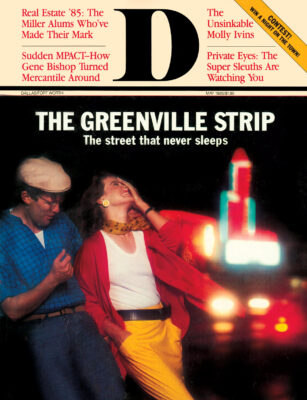THE PRACTICE OF dentistry is rapidly becoming obsolete. Tooth decay in the United States has declined approximately 50 percent since the mid-Sixties. Research by the American Dental Association shows that one out of every three college-age people has never had a cavity and that 80 percent of all dentists are not busy and may never be.
There are many contributing factors for this astonishing increase in America’s dental health, including better nutrition and better dental hygiene, but the one reason that stands above all the rest is fluoridation of the water supply. Drinking water was fluoridated in some American communities as early as 1946. Since that time, we have witnessed the rise of virtually decay-free teeth. According to North Dallas dentist Dr. John H. Wilson III. “In 15 to 20 years, high-profit techniques such as root canals, bridges, large fillings and crowns will be unusual.”
During the late Sixties, the federal government, believing Americans were getting inadequate health care, began spending money to encourage dental education. The result has been a gross oversupply of dentists in the face of rapidly declining demand. Texas schools in particular have resisted the theory that there is an oversupply of dentists.
However, the University of Texas System (which controls the UT dental schools in Houston and San Antonio and Baylor College of Dentistry) contends that the problem is not one of oversupply, but of maldistribution. They feel that a majority of graduates want to practice in the urban areas, which causes a great surplus of dentists in the cities and a shortage of dentists in the rural areas.
Dr. Wilson contends that these figures are strictly fabrications. “UT bases their figures on the assumption that 100 percent of the population sees a dentist regularly. That’s ridiculous-50 to 55 percent of the population doesn’t give a damn, and only sees a dentist when they absolutely have to.” Wilson adds, “There is great disparity between what the schools say and what the graduates who go out there and try to make a living say.” What does this manpower surplus mean for dentists? It means that a business that was once renowned for providing a “cushy” income and lifestyle is now becoming cutthroat and sometimes unethical just to make ends meet, according to several industry insiders, including Wilson.
A rider was attached to the Appropriations Bill sent to the Texas Legislature this year that would have reduced the enrollment of Texas dental schools by one-third. The rider was strongly supported by the Texas Dental Association. According to the TDA, inflation-adjusted incomes have dropped 19 percent for dentists who have recently graduated from dental schools. “I think the new students should be forewarned about the changes in the dental marketplace,” says Wilson. Even so, the rider was withdrawn from the bill.
According to Dr. Don L. Allen, Dean of the UT Houston Dental branch, Texas dental schools reduced their enrollments without being prompted by legislation. “We’ve been enacting a planned enrollment reduction for the past three years. Our 1982 entering class had 124 students. In 1985, we had 105 entering students. That’s a 15 percent reduction over three years, hardly the 33 percent immediate cut that TDA was advocating.”
Frequently, cases arise of dentists seeking alternate methods of meeting overhead demands. Allegations of overtreatment and insurance fraud are numerous. According to Forbes, a popular technique is waiving co-payments (in which a patient’s insurance company pays for 80 percent of the treatment and the patient covers the other 20 percent). An unethical dentist raises the treatment cost by 20 percent and quietly waives the patient’s responsibilty for the co-payment.
“It would be grossly unfair to say that this behavior is the industry standard,” says Wilson, “but it is on the upswing. Many dentists are surviving today by cheating the insurance companies and charging patients for treatment they don’t need. Some dentists advertise lower fees but then charge for more treatment. The lower fees are sleight-of-hand misdirection. The total treatment plan ends up costing more. I’m angry because success of these dentists is a result of the honest behavior of the majority. Dentistry used to serve the public, and we taught the public to trust us.” Wilson says the practices of these unethical dentists can only serve to reduce the public opinion of dentists to that of the proverbial used-car salesman. Dr. Richard J. Chapman, a Piano dentist who recently set up his own practice, disagrees: “I think the fraud has always been there. There are some really good dentists and some really bad ones, and most are just average. I don’t see any increase in fraud due to a manpower surplus.”
Dentistry is far from extinct, but the days of going into it for a comfortable income and lifestyle are over. Dentists, especially in Texas, face a major battle just to get by.
Related Articles

Arts & Entertainment
VideoFest Lives Again Alongside Denton’s Thin Line Fest
Bart Weiss, VideoFest’s founder, has partnered with Thin Line Fest to host two screenings that keep the independent spirit of VideoFest alive.
By Austin Zook

Local News
Poll: Dallas Is Asking Voters for $1.25 Billion. How Do You Feel About It?
The city is asking voters to approve 10 bond propositions that will address a slate of 800 projects. We want to know what you think.

Basketball
Dallas Landing the Wings Is the Coup Eric Johnson’s Committee Needed
There was only one pro team that could realistically be lured to town. And after two years of (very) middling results, the Ad Hoc Committee on Professional Sports Recruitment and Retention delivered.


